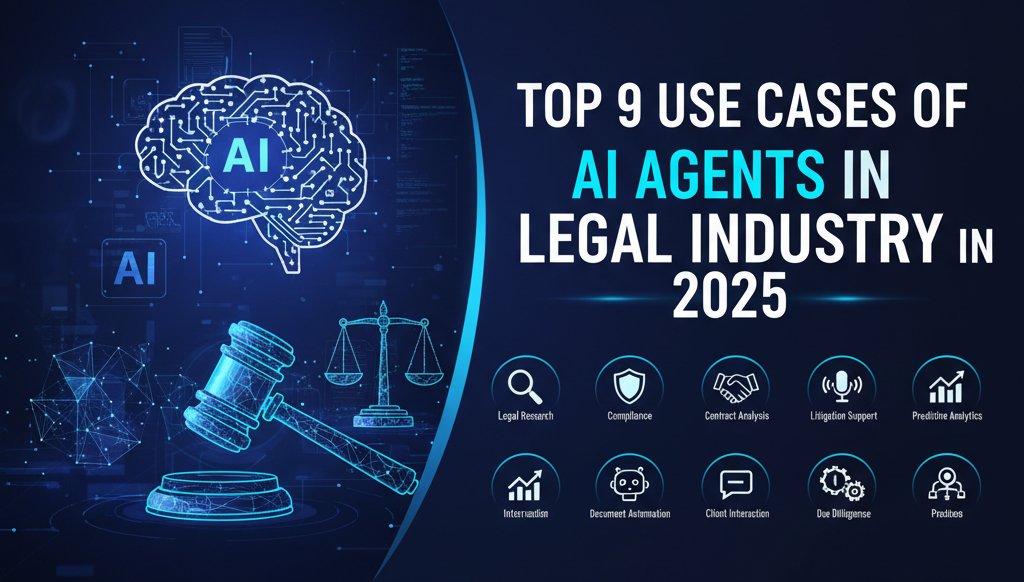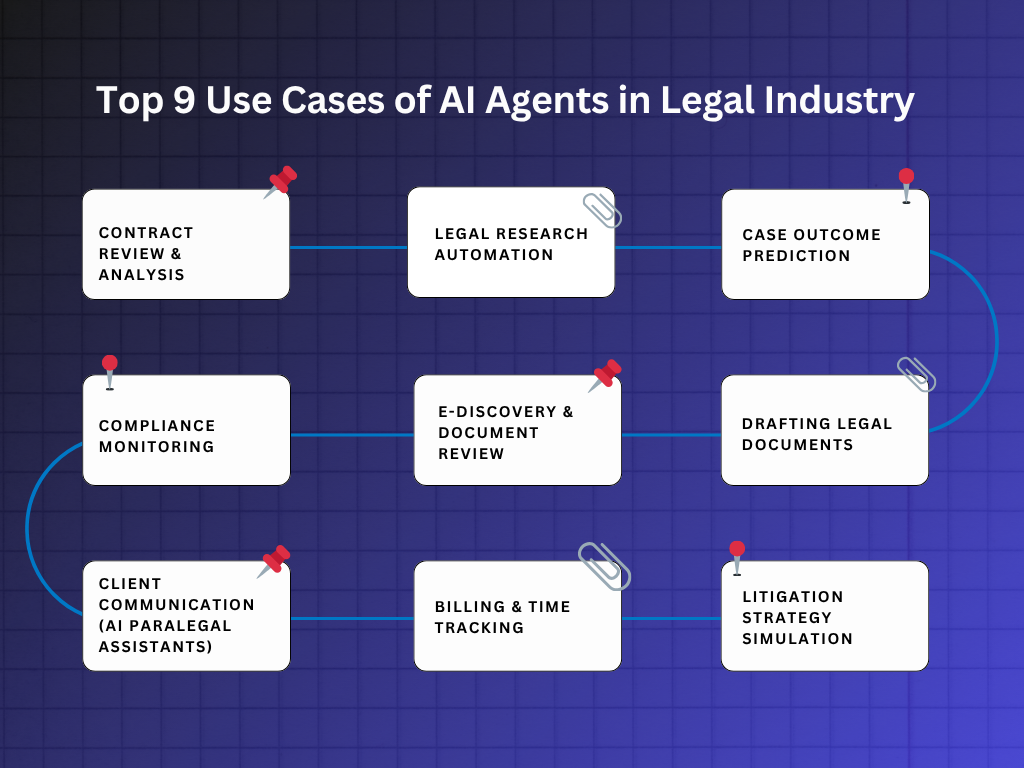
Top 9 Use Cases of AI Agents in Legal Industry in 2025

Ask any lawyer what their day looks like and you’ll hear the same story: endless contracts, mountains of research, client calls stacked back-to-back, and billing hours that somehow still don’t cover the workload. Now imagine trimming nearly a quarter of that grind. AI can automate 23% of a lawyer’s tasks. That’s not science fiction. That’s happening in 2025.
But here’s the twist most people miss: it’s not about replacing lawyers. It’s about giving them AI agents — digital colleagues trained to handle the repetitive, time-draining parts of the job so attorneys can focus on strategy, judgment, and clients.
Agentic AI in Legal Automation
Agentic AI is redefining how law firms operate, marking a new era in legal automation that goes far beyond traditional AI tools. Unlike earlier systems that required constant human oversight, agentic AI systems are designed to independently manage complex legal workflows with minimal human input.
This means legal professionals can delegate entire processes—like multi-step contract analysis or compliance monitoring—to artificial intelligence, allowing them to focus on strategic decision making and client relationships.
For law firms, the adoption of agentic AI translates directly into greater operational efficiency and a significant reduction in operational costs. These advanced AI systems can coordinate multiple tasks simultaneously, streamline document management, and ensure that legal workflows run smoothly from start to finish. As a result, legal teams can handle higher caseloads without sacrificing quality or client service.
The impact of agentic AI extends beyond just internal efficiency. By automating routine and complex legal work, law firms can offer faster, more responsive client service and even expand access to legal support for underserved communities.
Artificial intelligence AI is not just a tool for large law firms—agentic AI systems are scalable, making them accessible to firms of all sizes looking to stay competitive in the evolving legal industry.
Ultimately, agentic AI is empowering legal professionals to reimagine their roles, shifting from administrative tasks to higher-value work that requires human expertise and judgment. As the legal industry embraces this next evolution in AI technology, law firms that leverage agentic AI will be better positioned to deliver exceptional client service and thrive in a rapidly changing legal world.
Top 9 Use Cases of AI Agents in Legal Industry in 2025
Courtrooms may grab headlines, but the real grind of law happens behind the scenes in contracts, research, billing, and compliance. That’s where lawyers spend most of their hours.
In 2025, AI agents' platforms for legal expertise are changing that reality. Instead of drowning in routine, attorneys now have digital partners tackling repetitive work with speed and accuracy.

1. Contract Review & Analysis
Pain Point
Lawyers spend hours reviewing contracts line by line, flagging risks, and checking compliance language. A small mistake here can cost millions. Yet the process is repetitive and eats valuable time.
AI Agent Solution
AI agents for contract review can scan hundreds of pages in seconds, highlight unusual clauses, and compare terms with past contracts. Unlike traditional tools, agents don’t just spit out keywords. They provide context — like spotting indemnity clauses buried in appendices or identifying terms that deviate from industry standards. Firms are using these agents not only to save time but also to reduce disputes later.
2. Legal Research Automation
Pain Point
Researching case law and precedents is a grind. Associates often spend days searching for relevant judgments, digging through archives, and cross-referencing citations. Miss one precedent, and a case can collapse.
AI Agent Solution
Agents in AI for legal research goes beyond keyword search. Agents can understand the fact pattern of a case, pull judgments across jurisdictions, and even rank them based on relevance. Some firms report cutting research timelines from 40 hours to less than 8. These agents don’t replace judgment — they prepare a sharper foundation so lawyers argue with confidence.
3. Case Outcome Prediction
Pain Point
Clients constantly ask: “What are my chances of winning?” Lawyers rely on experience and intuition, but even seasoned experts can misjudge odds.
AI Agent Solution
Using decades of case history, AI agents for case prediction analyze patterns — judge behavior, jurisdiction-specific outcomes, and past verdicts on similar issues. They don’t give guarantees, but they provide data-backed probabilities. This changes how lawyers advise clients, from whether to settle early to how aggressively to litigate. In some firms, predictive insights are now part of standard case assessments.
4. Compliance Monitoring
Pain Point
Regulations shift constantly. For industries like finance, healthcare, or energy, compliance checks are overwhelming. Manual monitoring can’t keep up with daily changes in laws, reporting requirements, and industry rules.
AI Agent Solution
AI agents for compliance act like watchdogs. They track regulatory updates across multiple jurisdictions and compare them with internal policies. If a new data privacy rule comes into effect, the agent flags documents, workflows, or client contracts that need updating. This keeps firms and their clients out of trouble before regulators step in.
5. E-Discovery & Document Review
Pain Point
In litigation, millions of documents may need review. Emails, contracts, memos, text messages — it’s overwhelming. Traditional discovery costs balloon quickly.
AI Agent Solution
AI agents in e-discovery can sift through massive document sets, detect relevance, and even identify subtle connections humans might miss. They can recognize patterns like repeated phrases that suggest collusion or flag anomalies in financial records. By narrowing the universe of documents, agents let human lawyers focus only on what matters.
6. Drafting Legal Documents
Pain Point
Drafting NDAs, employment agreements, or partnership contracts eats up hours, even though much of the text is repetitive boilerplate. Junior associates often spend weeks just writing drafts.
AI Agent Solution
AI agents for drafting can generate complete documents based on prompts or templates, adjusting clauses to client requirements. For example, an AI agent can prepare a partnership deed with standard terms, then flag specific clauses for human review. This isn’t about handing over drafting — it’s about giving lawyers a 70% head start.
7. Client Communication (AI Paralegal Assistants)
Pain Point
Lawyers juggle dozens of client queries daily — status updates, clarification on terms, explanations of legal jargon. It eats into billable hours without adding strategic value.
AI Agent Solution
Think of these as AI paralegal assistants. They handle FAQs, explain case timelines in plain English, and provide regular status updates. Some firms now deploy agents that text clients about upcoming hearings or deadlines. This keeps clients engaged while freeing lawyers to focus on complex discussions.
8. Billing & Time Tracking
Pain Point
Billing is a pain point for both sides. Lawyers dislike logging every minute, and clients question bills when details aren’t clear. Manual systems lead to disputes and delayed payments.
AI Agent Solution
AI agents for billing and time tracking automatically capture work hours, categorize tasks, and generate transparent invoices. They can even flag under-billed hours. This reduces disputes, gets firms paid faster, and builds trust with clients who see exactly what they’re being charged for.
9. Litigation Strategy Simulation
Pain Point
Planning litigation strategy has always been guesswork. Lawyers rely on experience but can’t model all possible outcomes.
AI Agent Solution
Here’s where it gets futuristic. AI agents for litigation simulation can create multiple scenarios: how a jury might respond, which arguments resonate, or how opposing counsel has performed in similar cases. It’s like running “trial rehearsals” digitally. Some firms use these simulations to refine arguments before stepping into court, giving them a competitive edge.
Ensuring Client Confidentiality
For law firms, client confidentiality is non-negotiable. As AI agents become more integrated into legal workflows, law firm leaders must prioritize the protection of sensitive client data.
Implementing AI agents means choosing AI tools that are built with robust security features—such as end-to-end encryption, secure servers, and strict access controls—to ensure that only authorized personnel can access or modify client information.
By taking these precautions, law firms can maintain the trust of their clients and demonstrate a commitment to responsible use of AI technology. Ensuring client confidentiality isn’t just about compliance; it’s about upholding the core values of the legal profession while embracing innovation.
Data Security Measures
Deploying AI agents in legal practice requires a proactive approach to data security. Law firms must conduct regular security audits, implement secure communication protocols, and provide ongoing training to legal professionals on best practices for handling client data.
It’s also essential for AI providers to design their tools with security at the forefront, using techniques like encryption and anonymization to safeguard sensitive information. By working together, law firms and AI providers can minimize the risk of data breaches and ensure that client data remains protected at every stage.
Prioritizing data security not only protects clients but also strengthens the reputation of law firms as trustworthy stewards of confidential information.
Challenges of Implementing AI Agents
While the benefits of AI agents are clear, implementing them in law firms comes with its own set of challenges. Law firm leaders must invest in the right technology, provide comprehensive training for legal teams, and ensure that AI agents are seamlessly integrated into existing legal workflows.
There are also ethical concerns to consider, such as the potential for bias in AI decision making and the need for transparency in how AI agents operate. Importantly, AI agents should be used to complement—not replace—human expertise, with legal professionals providing oversight and judgment on complex legal matters.
By understanding and addressing these challenges, law firms can unlock the full potential of AI agents and drive meaningful change in legal practice.
Best Practices for AI Agent Deployment
To get the most out of AI agents, law firms should follow a set of best practices that ensure both effectiveness and compliance. Start by conducting a thorough needs assessment to identify where AI agents can add the most value.
Choose AI tools that align with your firm’s specific requirements and provide ongoing training and support to legal professionals to ensure smooth adoption. Establish clear policies and procedures for AI agent use, covering data handling, confidentiality, and ethical guidelines. Regularly review and update your AI deployment strategies to keep pace with technological advances and evolving firm goals.
By following these best practices, law firms can maximize the benefits of AI technology, minimize risks, and ensure that AI agents enhance—rather than replace—human expertise in legal practice.
Future Outlook: Hybrid Practice Ahead
AI agents won’t replace lawyers — they’ll reshape how law firms work. The future looks more hybrid: humans leading strategy while agents handle the heavy lifting.
1. Human Judgment Still Matters
AI can analyze a precedent, but it can’t weigh the emotional impact of a witness. It can draft a contract, but it can’t sense when a client is uncomfortable with a clause. Human empathy, negotiation, and persuasion remain irreplaceable.
2. Ethical Concerns on the Horizon
As AI agents handle more legal work, questions arise: Who’s responsible if an AI-made error costs a client? Should AI-generated documents carry disclaimers? Regulators are already drafting guidelines, and law firms must prepare for stricter rules around AI use in practice.
3. Global Legal Ecosystem Will Shift
Expect to see differences by region. U.S. courts may accept AI-assisted filings sooner, while European regulators may impose stricter guardrails. Multinational firms will need strategies that adapt across jurisdictions.
Conclusion
Here’s the truth: AI agents in legal industry are no longer “coming soon.” They’re already here, quietly handling research, drafting, compliance, and even litigation prep.
For lawyers, the opportunity is massive. Instead of drowning in paperwork, they can redirect time to strategy, clients, and higher-value work. For clients, this means faster service, better predictions, and more transparency.
By 2025, law firms that treat AI agents as part of their team — not just tools — will set themselves apart. Those who wait risk falling behind.
Law firms embracing AI agents for legal expertise today will be the ones dominating tomorrow. The question is: are you ready to let digital colleagues share the workload?
FAQs
Q1: How are AI agents helping lawyers in 2025?
AI agents help with research, drafting contracts, reviewing compliance, and even predicting case outcomes. They save time so lawyers can focus on strategy.
Q2: Can AI agents replace human lawyers?
No. They handle repetitive, data-heavy tasks, but human judgment, empathy, and courtroom presence are still irreplaceable.
Q3: Are AI agents used in legal research?
Yes. They scan millions of cases, statutes, and rulings in seconds, giving lawyers faster and more accurate insights.
Q4: Do small law firms benefit from AI agents?
Absolutely. Many affordable tools help smaller firms with client intake, document review, and case prep.
Q5: Is using AI agents in law safe and compliant?
Yes, when used with guardrails. Most legal AI tools meet strict data security and confidentiality standards.

Transform Your Business With Agentic Automation
Agentic automation is the rising star posied to overtake RPA and bring about a new wave of intelligent automation. Explore the core concepts of agentic automation, how it works, real-life examples and strategies for a successful implementation in this ebook.
More insights
Discover the latest trends, best practices, and expert opinions that can reshape your perspective
Contact us






.png)





